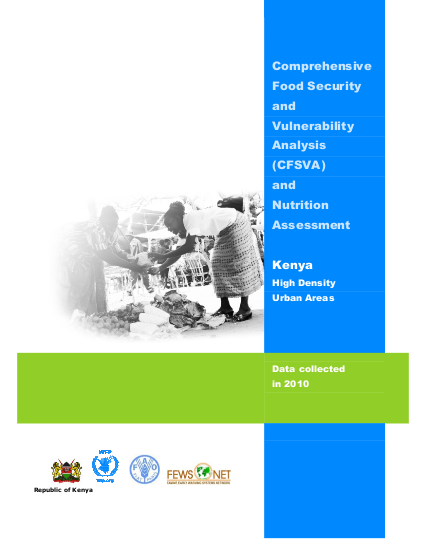
The rapid growth and urbanization of Kenya’s population has resulted in a changing poverty and foodsecurity environment in high-density urban areas. Urban dwellers represent an increasingly important share of the food insecure and malnourished. Little is known about the characteristics of urban food insecurity and malnutrition, however. The present study: Kenya Urban - Comprehensive Food Security and Vulnerability Analysis (KU-CFSVA) and Nutrition Assessment, was undertaken with the following objectives: 1. Characterize food insecurity, vulnerability and malnutrition patterns in low-income, high-density urban household settings; 2. Identify the main problems and priorities for addressing food insecurity and malnutrition within low-income, high-density urban households; 3. Evaluate on-going response activities and similar interventions, their scale, location, impacts and gaps;
4. Establish a hierarchy of key food security problems within urban high-density households and subsequently develop a response analysis; 5. Evaluate the dynamics of rural-urban migration in low-income, high-density urban areas; 6. Establish a baseline to inform future urban food insecurity and malnutrition monitoring, analysis and reporting, specifically devised for low-income, high-density urban households.
The present report presents the results of mixed method research that took place in 2010 to address these objectives. The research included a series of assessments, including key informant interviews, focus groups, market assessments, questionnaires and most importantly, a survey of 3,900 randomly selected households.
For this survey, households were selected at random to represent the population in high-density urban areas in nine livelihood clusters from across Kenya. In each livelihood cluster, enumeration areas were selected in high-density urban areas. In each enumeration zone, 20 households were randomly approached, either from a household list or by using a random, geographical approach. Interviews were conducted by trained interviewers using a structured questionnaire covering 14 sections related to food security and nutrition.
Resource collections
- Evaluating humanitarian action
- Monitoring and Evaluation (M&E)
- Monitoring of humanitarian action
- UN Habitat - Urban Response Collection
- Urban Response - Urban Crisis Preparedness and Risk Reduction
- Urban Response Collection - Community Engagement and Social Cohesion
- Urban Response Collection - Economic Recovery
- Urban Response Collection - Environment and Climate Change
- Urban Response Collection - Housing, Land and Property
- Urban Response Collection - Urban Crisis Response, Recovery and Reconstruction
- Urban Response Collection - Urban Resilience
- Use of evaluation evidence